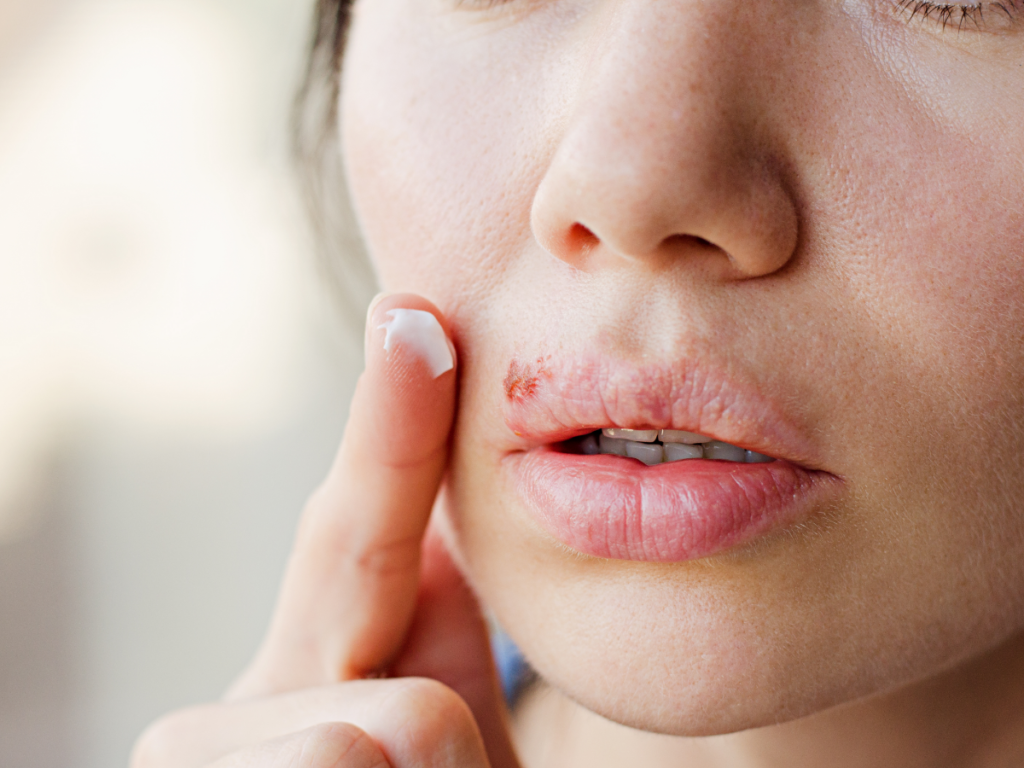Herpes is one of the most widespread viral infections globally, yet it remains highly stigmatised. This National Herpes Awareness Mont, we want to help combat the stigma and explain what herpes is, how it causes symptoms and how it can be treated.
What is herpes?
There are two types of herpes viruses that can cause lifelong infections:
- Herpes simplex virus type 1 (HSV-1) has historically been associated with oral herpes infections and cold sores.
- Herpes simplex virus type 2 (HSV-2) has traditionally been linked to genital herpes outbreaks.
However, both HSV-1 and HSV-2 can be transmitted through direct skin-to-skin contact and isolated from anywhere on the body. While HSV-1 is often spread through oral contact, and HSV-2 via sexual contact, both types of the virus can infect your mouth or genitals. This means HSV-1 can sometimes cause genital herpes, too. Additionally, herpes infections sometimes occur on other areas of the skin through viral shedding and contact.
Many people aren’t aware they have the infection and can pass along the virus to others without knowing. In the UK, approximately 7 in 10 people are infected with HSV-1, and 1 in 10 people infected with HSV-2.
Once you’re infected with either HSV-1 or HSV-2, the virus stays dormant inside your nerve cells. When it reactivates, it causes outbreaks of painful blisters or sores at the initial infection site or nearby areas.
What are the risk factors?
Herpes infections are more prevalent in people with underlying skin conditions like eczema or psoriasis. These conditions cause dryness, cracking, and irritation, which compromises your skin barrier and makes it easier for the virus to get in and cause an outbreak.
People with eczema tend to have more frequent and severe herpes infections because eczema affects your immune system’s ability to suppress the virus. If you have eczema, you can limit your risk by using moisturiser and other emollients such as E45 to repair your skin barrier and minimise damage caused by scratching.
What are the symptoms of herpes?
First infection
Many people with herpes won’t experience any symptoms when first infected. If symptoms do occur, they take between 2–12 days after initial exposure to appear. They may include:
- Flu-like symptoms, like fever, fatigue and body ache
- Swollen lymph nodes in your groin or neck
- Multiple painful ulcers around mouth or genitals
- Urinary difficulties with first genital infection
Typically, your first outbreak is the most severe infection you’ll have. It normally clears within 10-14 days without treatment.
Recurrent outbreaks
When the dormant virus reactivates, it replicates inside your body and causes inflammation and skin lesions. Symptoms include:
- Tingling, burning, or itching at the infection site
- Redness and swelling
- Small ulcers or sores on the face or around the genitals
- Flu-like symptoms
- Swollen glands
Recurrent infections are typically less severe than your first infection and take 2–3 weeks to clear.
What causes herpes outbreaks?
After initial infection, many factors can cause the virus to reactivate and trigger a herpes outbreak, including:
- Stress
- Fatigue
- Illness
- Menstruation
- Sun exposure
- Skin irritation
While outbreaks tend to become less frequent over time, exposure to triggers can cause periodic flare-ups.
How do I know if I have genital herpes?
If you think you’ve contracted genital herpes, visit a sexual health clinic. The diagnosis is confirmed by rolling a swab over the ulcer and testing it. This test can’t be done if you have no ulcers. It also can’t confirm how long you’ve had the infection for, or who the infection came from. All visits to a sexual health clinic are confidential and no medical information is shared, unless instructed by you.
How can I treat herpes?
How can I treat herpes?
Oral antiviral medicines can speed up the healing process and lessen the severity of symptoms. They work by inhibiting the enzyme the virus needs to replicate its DNA and reproduce. The most commonly used treatment is aciclovir, which should be taken within 5 days of symptoms appearing for maximum effectiveness. Other treatment options include valacyclovir and famciclovir.
How can I manage symptoms during a herpes outbreak?
- Take regular pain relief such as paracetamol and ibuprofen as directed
- Applying cold packs wrapped in a towel to relieve pain — never apply ice directly to the area
- Pour cool water over the affected area when you pee
- Apply vaseline or numbing cream (5% lidocaine) to ease pain, particularly when peeing
- Wash your hands before and after any cream application
- Avoid tight clothing that may cause irritation
- Avoid touching the infected area, unless applying cream
- Avoid oral, vaginal and anal sex until all sores have gone away
How do I prevent outbreaks?
Suppression treatment involves taking a low daily dose of an antiviral medication like valacyclovir or famciclovir for an extended period of time, often 6–12 months. This helps to keep the virus in a dormant state, which can prevent or reduce outbreaks. It’s an effective treatment option if you have six or more herpes flare-ups per year, or you get severe, prolonged symptoms during outbreaks. After this treatment period, you should stop taking the medication to see if your outbreak patterns have changed. If they don’t improve, you can try suppression treatment again.
With MedExpress, you can access herpes treatments without visiting a GP or pharmacy. Start a consultation now and get clinically effective medications delivered quickly and discreetly to your door.



